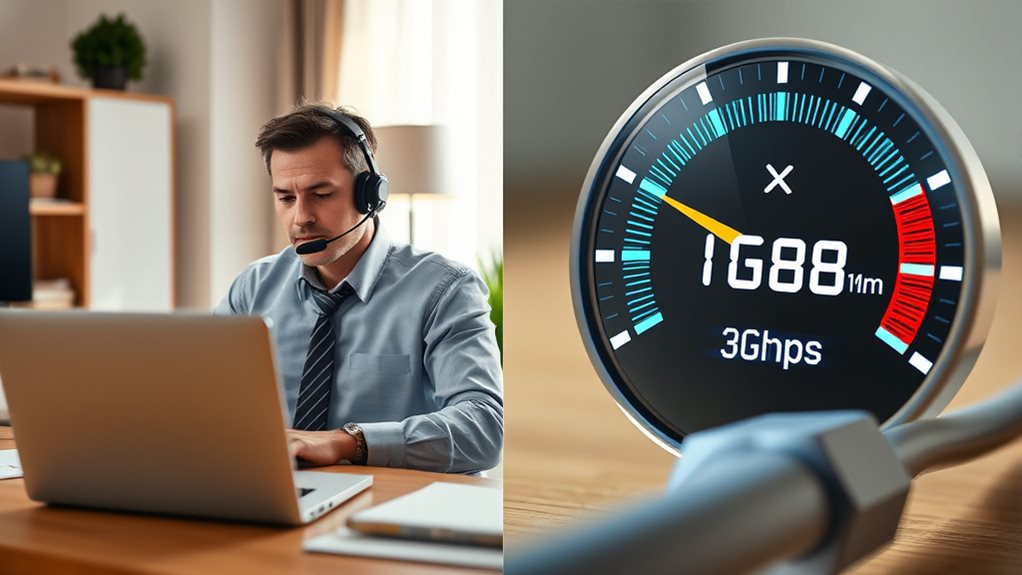Don't let common VoIP myths hold your business back from embracing modern communication solutions. Today's VoIP systems deliver crystal-clear call quality, robust security features, and significant cost savings compared to traditional phone lines. You'll find user-friendly setups that don't require extensive technical expertise, along with advanced features like video conferencing and unified messaging. With reliable internet connectivity, VoIP offers scalable, future-proof communication that grows with your organization. Let's explore how these misconceptions might be limiting your business potential.
Myth: Voip Call Quality Is Inferior to Traditional Phone Lines
While many people still cling to outdated beliefs about VoIP technology, the notion that VoIP calls sound worse than traditional landlines couldn't be further from the truth.
When properly configured, today's VoIP systems deliver exceptional call clarity that rivals or surpasses conventional phone lines.
You'll find that modern VoIP solutions have evolved considerably, offering crystal-clear audio quality when supported by stable internet connectivity.
The key to ideal performance lies in your network stability – with a reliable connection, you'll experience seamless communication that your colleagues and clients will appreciate.
Common issues like echoes, delays, or choppy audio typically stem from network configuration rather than VoIP technology itself.
Furthermore, the integration of advanced codecs has significantly enhanced audio transmission quality, ensuring that VoIP calls maintain high clarity even in variable network conditions.
Myth: VoIP Systems Are Too Expensive to Implement
Although many businesses hesitate to adopt VoIP due to perceived high costs, today's VoIP solutions actually offer significant cost savings compared to traditional phone systems.
You'll discover that modern implementation strategies make the change surprisingly affordable, with many providers offering flexible payment plans and scalable solutions that fit your budget.
When you factor in reduced maintenance costs, lower international calling rates, and the elimination of separate voice and data networks, you're looking at substantial long-term savings.
Most businesses find they can cut their communication expenses by 30-50% after switching to VoIP.
Additionally, you won't need to invest in expensive hardware since many VoIP systems work with your existing computers and internet connection.
The initial setup costs are typically offset within the first year through reduced monthly bills. Moreover, VoIP systems are easily scalable, allowing businesses to effortlessly adjust their communication needs as they grow.
Myth: VoIP Requires Complex Technical Expertise

The fear of technical complexity shouldn't hold you back from implementing VoIP technology. Today's VoIP solutions offer remarkably user-friendly setup processes that won't leave you scratching your head. You'll find that most providers have streamlined their systems for business owners just like you.
While there's certainly an adjustment period, thorough user training guarantees your team can master the essential features quickly. Many providers offer step-by-step guides, video tutorials, and dedicated support teams to help you navigate any challenges.
You won't need an IT degree to manage your VoIP system effectively. Instead, you'll discover that basic computer literacy is typically sufficient for day-to-day operations. With the right provider and proper support, you can confidently shift to VoIP without technical headaches. Additionally, VoIP systems provide cost-effective communication solutions that enhance overall operational efficiency and reduce expenses.
Myth: Voip Is Not Secure for Business Communications
Contrary to widespread concerns, modern VoIP systems offer robust security features that match or exceed traditional phone systems.
You'll find that today's VoIP encryption methods protect your conversations from unauthorized access, while secure communication protocols safeguard your data transmission.
When you're using a business VoIP solution, you're benefiting from multiple layers of security, including end-to-end encryption and advanced authentication measures.
Your voice data is transformed into encrypted packets that can't be intercepted or decoded by malicious actors.
Many providers also implement regular security updates and compliance measures to protect your business communications.
You're actually getting more security features with VoIP than traditional phone systems, as providers continuously enhance their protection mechanisms to address emerging threats.
Moreover, implementing strong security protocols is crucial to protect against unauthorized access attempts.
Myth: Voip Only Works With Perfect Internet Connections

Modern VoIP technology has evolved substantially, offering reliable communication even with less-than-perfect internet connections. While it's true that internet reliability plays a role in call quality, today's VoIP systems incorporate advanced features to maintain stable connections in various network conditions.
You don't need blazing-fast internet speeds to use VoIP effectively. Most systems adapt to your available bandwidth, and with basic troubleshooting techniques, you can optimize your setup for consistent performance.
When connection issues arise, built-in quality controls automatically adjust to preserve call clarity. Many providers also offer bandwidth management tools that help prioritize voice traffic over less critical data. Additionally, investing in quality headsets can significantly enhance the overall experience by improving audio clarity and reducing background noise.
Myth: VoIP Features Are Limited Compared to Traditional Systems
You'll find that modern VoIP systems actually offer more features than traditional phone systems, including advanced call routing, video conferencing, and seamless CRM integration.
Through unified communications, you're able to boost your team's productivity by connecting voice calls, instant messaging, and file sharing into one streamlined platform.
Whether you're running a small business or large enterprise, you'll have access to professional-grade tools like interactive voice response (IVR), call analytics, and virtual phone numbers that traditional systems simply can't match. Additionally, enhanced collaboration through features like video conferencing and chat ensures seamless communication among remote employees.
Advanced Features Exceed Landlines
Despite the persistent belief that traditional phone systems offer more functionality, VoIP technology actually provides a substantially richer feature set that'll transform how you communicate.
When you're making a feature comparison between VoIP and traditional landlines, you'll discover that VoIP's advanced capabilities far surpass older systems. You can integrate video conferencing, instant messaging, and real-time collaboration tools seamlessly into your communication workflow.
Beyond basic calling, you'll have access to voicemail transcription, automated attendants, and call analytics that help you make data-driven decisions. Your team can take advantage of features like call forwarding to mobile devices, conference bridges that accommodate hundreds of participants, and customizable call routing.
These modern solutions guarantee you're always connected and productive, whether you're working from the office or remotely. Additionally, implementing VoIP can lead to significant cost savings that further enhances your business's operational efficiency.
Unified Communications Boost Productivity
Building on these advanced capabilities, unified communications through VoIP creates a seamless workflow that directly impacts your team's productivity.
The myth that VoIP limits your communication options couldn't be further from the truth. With unified messaging and modern collaboration tools, you'll join countless organizations that have transformed their operations.
Your team can experience enhanced productivity through:
- Instant access to voicemails, emails, and messages in one unified inbox
- Real-time collaboration with screen sharing and virtual whiteboards
- Seamless shifts between devices while maintaining active conversations
You'll find yourself wondering how you ever managed without these integrated features.
Today's VoIP solutions bring your team together, whether they're working from home, at the office, or on the road. By centralizing your communications, you're eliminating the barriers that once slowed your workflow. Furthermore, as unified communications evolves, it continuously enhances the options available for effective collaboration and communication.
Enterprise-Grade Tools Available
When comparing VoIP systems to traditional phone setups, modern VoIP solutions actually offer a more extensive range of enterprise-grade features.
You'll find that today's enterprise solutions include advanced call routing, multi-party video conferencing, and seamless integration with your existing business software.
These communication platforms provide sophisticated tools that were once available only to large corporations with substantial budgets.
Now, you can access features like real-time analytics, automated attendants, and customizable call flows that enhance your team's efficiency.
Plus, you'll benefit from regular software updates that continuously add new capabilities, ensuring your system stays current with evolving business needs.
VoIP's scalability means you can easily add or modify features as your organization grows, making it a future-proof choice for your communication infrastructure.
Moreover, cost-effective communication helps businesses save on expenses while accessing these advanced functionalities.
Frequently Asked Questions
Can Voip Systems Integrate With My Existing CRM Software?
Yes, you'll find VoIP benefits include seamless CRM compatibility with most popular platforms. Your team can enjoy integrated calling, contact management, and customer data tracking all in one place, enhancing your workflow efficiency.
What Happens to My Voip Service During a Power Outage?
Your VoIP service needs both power and internet to work. You'll want to invest in power backup solutions like UPS systems to stay connected. Many businesses use cellular backup to guarantee uninterrupted communication during outages.
Can I Keep My Existing Phone Number When Switching to Voip?
Yes, you can keep your current phone number! Through a simple porting process, your VoIP provider will handle the number transfer for you. You'll stay connected with the same familiar number your friends and family know.
Are There Any Special Maintenance Requirements for Voip Hardware?
You'll find VoIP hardware maintenance is straightforward. Just keep your equipment dust-free, guarantee proper ventilation, and follow basic VoIP troubleshooting tips. With good care, your VoIP hardware lifespan can exceed five years.
How Many Concurrent Calls Can a Voip System Handle?
Your VoIP system's call capacity depends on your network requirements and bandwidth. You'll typically handle dozens or hundreds of concurrent calls, but you can easily scale up as your team grows and needs change.
Final Thoughts
Now that you've seen the truth behind these common VoIP myths, you're better equipped to make informed decisions about your communication needs. VoIP technology has matured considerably, offering reliable, secure, and cost-effective solutions for businesses of all sizes. Don't let misconceptions hold you back from embracing the advantages of modern telecommunications. It's time to evaluate VoIP based on facts rather than outdated assumptions.

